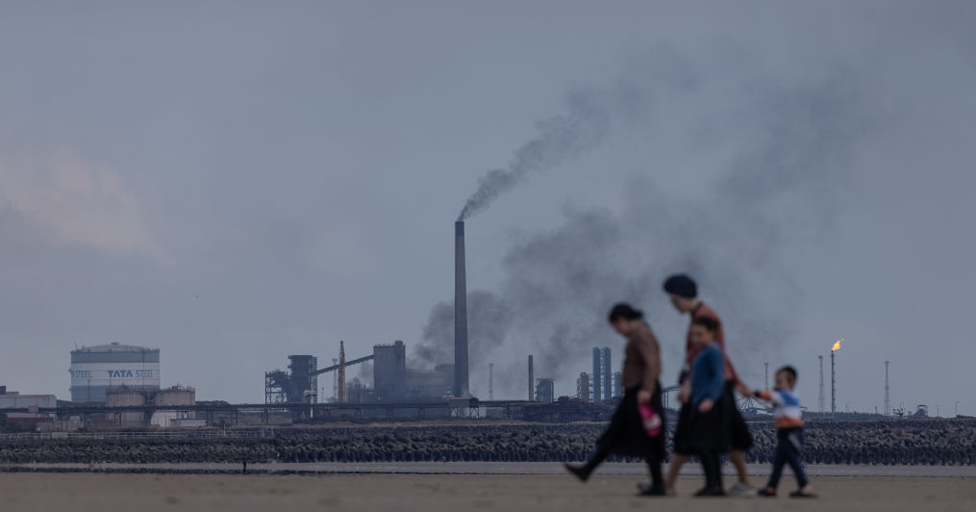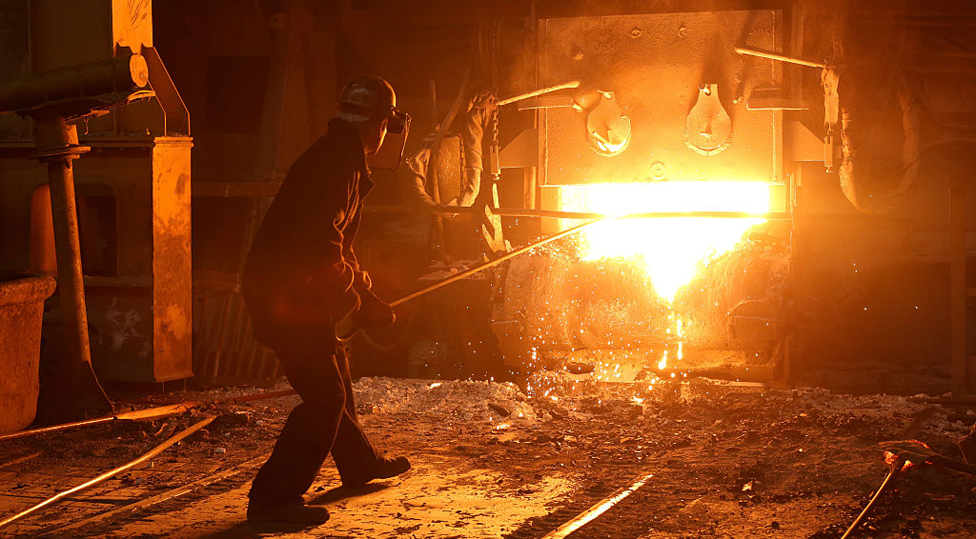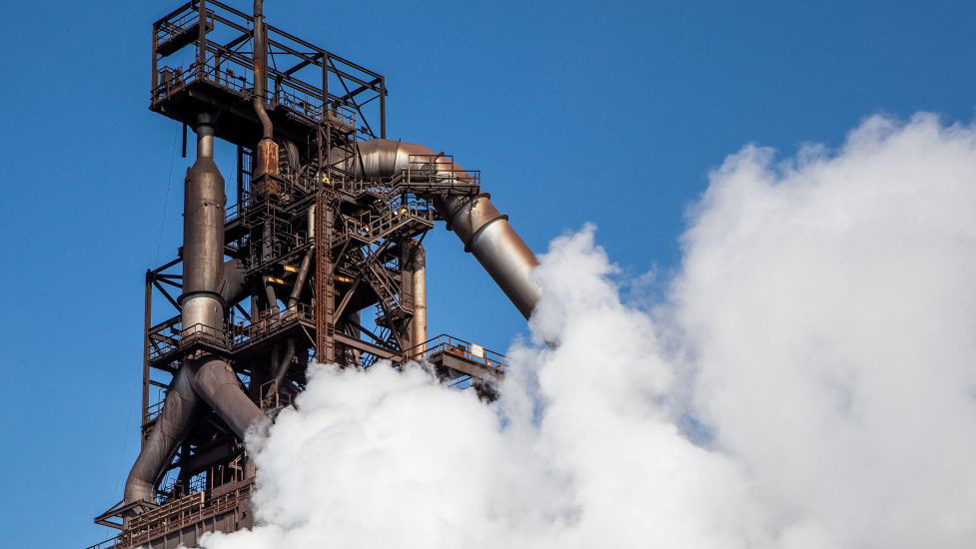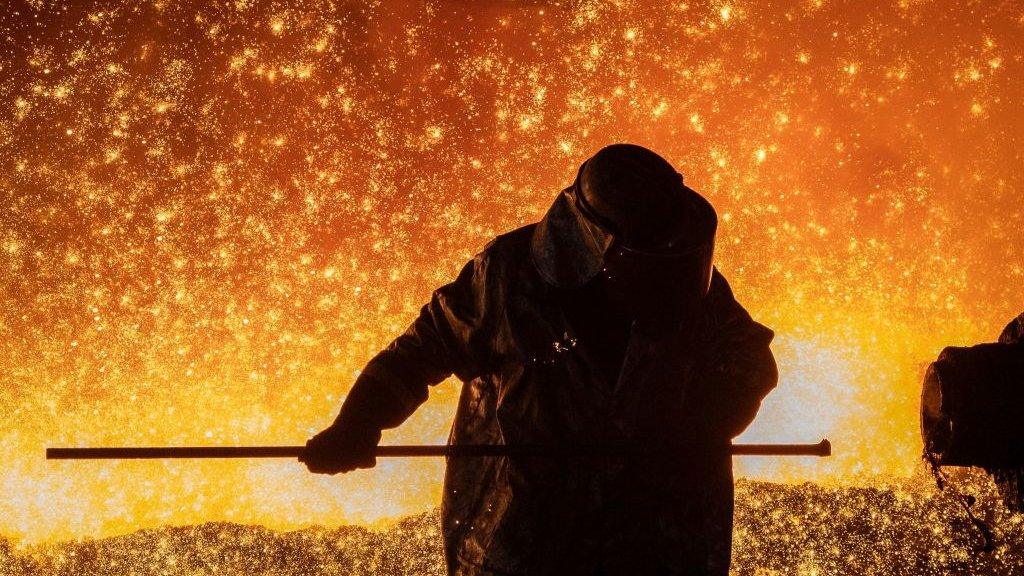Port Talbot steelworks: Tata workers left stranded, say campaigners
- Published

Tata says the switch could slash the site's emissions by around 85% a year
Workers have been left stranded by Tata Steel's announcement of 2,800 job losses as part of a move to greener steel, say campaigners.
Greenpeace policy director Doug Parr said it was a "missed opportunity".
He believes some of the Port Talbot workforce could have taken part in a pilot to explore the potential of manufacturing steel using hydrogen.
The UK government said hydrogen powered steelmaking is not "commercially viable" at the moment.
Tata's managing director TV Narendran said he was not ruling out further investment in natural gas or hydrogen powered steelmaking at Port Talbot in the future.
"If [natural] gas was available here we could have considered that even today," he said.
"Hydrogen is even further away. So these are not off the table. I think this is just the first step."
The jobs are going because Tata is shutting down both blast furnaces at its Port Talbot site and building a "more sustainable, green steel business" using an Electric Arc Furnace (EAF).
Blast furnaces make new steel from iron ore, usually by burning coal which produces a lot of carbon dioxide, a gas which contributes to global warming.

An electric arc furnace at a steel plant in Izhevsk, Russia
Tata said that closing them would reduce "overall UK country emissions by about 1.5%".
But Dr Parr said: "It is not the just transition we want to see where workers in carbon intensive industries should be helped and supported into other forms of employment."
The Port Talbot plant is the UK's biggest steelworks employing about 4,000 people.
A total of 8,000 people work for Tata around the UK.
Unions said they expect the bulk of the job losses will be at Port Talbot, but Tata has not confirmed the breakdown.
Tata Steel is planning to build the EAF, which produces recycled steel from scrap using electricity, by 2027.
EAFs are more automated and require a much smaller workforce.
Dr Parr said the UK government was missing out on the chance to pioneer green technology "and answer the strategic question of whether we want to stay a producer of steel".
"Around Europe there are 40 plants being set up that use this technology," he said
There is currently no infrastructure in place to supply hydrogen or natural gas to the Port Talbot plant.
David Davies, the Welsh Secretary, said the UK government had given Tata £500m to build the EAF to secure the future of the Port Talbot site and the bulk of the 8,000 strong workforce around the UK.
Mr Davies said hydrogen powered steel "is not commercial".
He added: "It's 25% more expensive than the steel produced from a blast furnace.
"We cannot produce steel in that fashion in anything like the quantities that would be needed to make that viable."
Tata UK said its plans were "intended to reverse more than a decade of losses" as well as reducing carbon emissions and "maintain the country's self-sufficiency in steelmaking".
Unions have condemned the decision to cut jobs and urged Tata to reconsider alternative proposals.

Are you a Tata Steel worker? Share your views and experiences by emailing haveyoursay@bbc.co.uk, external.
Please include a contact number if you are willing to speak to a BBC journalist. You can also get in touch in the following ways:
WhatsApp: +44 7756 165803
Tweet: @BBC_HaveYourSay, external
Please read our terms & conditions and privacy policy
If you are reading this page and can't see the form you will need to visit the mobile version of the BBC website to submit your question or comment or you can email us at HaveYourSay@bbc.co.uk, external. Please include your name, age and location with any submission.
Related topics
- Published19 January 2024

- Published3 November 2023
